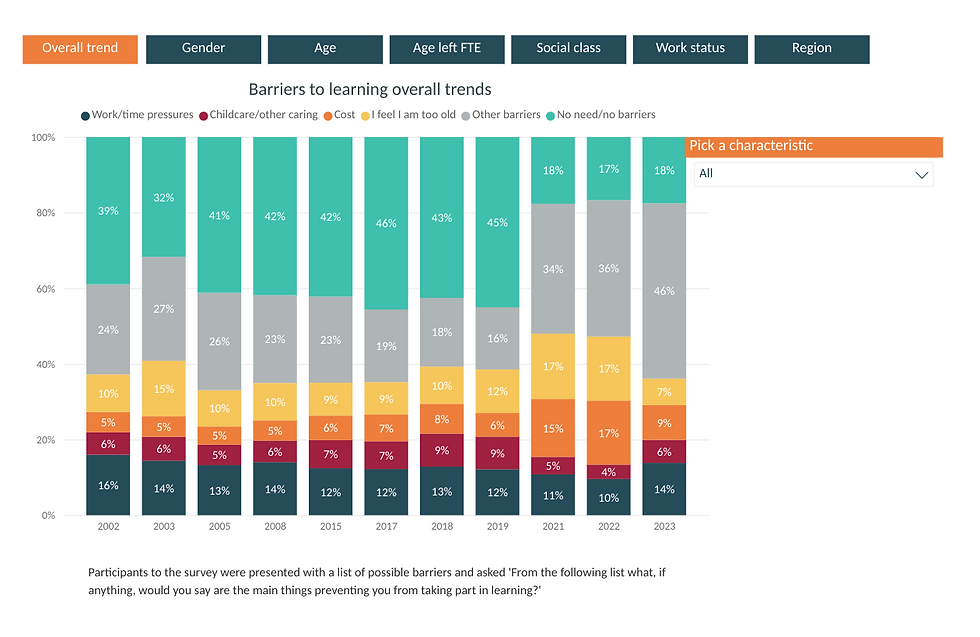Five Insights from the Adult Participation in Learning Survey 2023
- Rebecca Savill
- Dec 21, 2023
- 4 min read
Every year the Learning & Work Institute does some fantastic quantitative data research in the form of the Adult Participation in Learning Survey. They’ve been doing this survey every year since 1996 and each time they ask 5000 adults about their experiences of learning in the past, present and future. It’s a great resource for understanding the current trends in adult learning and something we’ve been very interested in.

I’ve been meaning to write a blog post/article about this for a while but life kept getting in the way. Anyway, I’ve now found the time and so in this blog post, I'm going to distil this treasure trove of data into five key insights to help you enhance workplace learning in your team.
1. Encourage Lifelong Learning:
The survey results reveal a decline in learning participation as individuals age. On the face of it, this kind of makes sense. Younger members of the team are going to need a lot more initial training and learning, and older team members will have a lot more knowledge built up over a full career.
However, we all know that no industry stands still and there are constantly new developments to keep up with. If your older team members have been working for 30 or 40 years just think of all the changes that have already happened in that time. As the population ages and our teams get older we can’t afford to simply give up learning new things and remaining masters of our craft.
To help your older team members keep learning, make sure you give them more time to learn new things as it can often take a bit longer to grasp something new as we age. It can also help to put the new knowledge into context alongside their already large industry knowledge. It’s always easier to learn something if it relates to the knowledge we already hold.
2. Remove Barriers to Learning:
While it’s no shock that the majority of adults cite facing barriers to learning, it might surprise you that only 14% said work/time pressure prevented learning or made it difficult. Almost half said that it was other barriers which affected their learning. This category encompassed numerous reasons such as travel, lack of confidence or being unsure what learning was available, among many others.
The really shocking result is that in 2023 only 63% of full-time workers and 54% of part-time learners think it’s very likely or fairly likely they'll take part in learning in the next three years. Three years!
To overcome these barriers, you need to have a conversation with your team members about the issues they face in trying to learn. Then you need to put in the time and effort to remove those barriers. For some people, this will mean carving out time for them to learn, but for others, the solution will likely be something unique.
3. Empower Through Choice:
While formal learning such as work-based training and higher education made up over half of adult learning, a third were taking part in independent learning, either on their own or with others. This is up from previous years and shows that people are willing to take more ownership of their learning.
You can harness this enthusiasm for independent learning by letting your team choose what they learn. This may sound scary, but the reality is that your team are best positioned to decide what knowledge will help them overcome challenges and succeed. People learn much more effectively when they are actually interested in what they learn, and nothing kills motivation faster than being forced to learn something you don’t care about. Which leads us to…
4. Provide Context for Learning:
Over 60% of respondents participate in learning for career progression or personal development. This emphasises the willingness of adults to take control of their learning for the sake of their careers or to improve themselves.
This doesn’t mean that your team are trying to learn new skills to sharpen their CV and move on, but that they are seeking mastery in their work. You can leverage this opportunity by offering context around the importance of learning, not just for the organisation but also for individual growth.
Of course, most large organisations demand some types of mandatory learning, but these should be kept as minimal as possible and even then the purpose should be explained and why it should matter to them and their work. If you can’t explain why it’s important then it’s obviously not that important after all!
5. Get Started:
A reassuring 94% of survey respondents acknowledged the benefits of learning, with 40% seeing direct benefits to their work, 25% seeing a personal benefit and 29% seeing a benefit from obtaining a qualification or enjoying learning in general.
You can capitalise on this positive outlook by making learning experiences interesting and engaging. Once employees experience the benefits firsthand, the momentum for continuous learning will naturally build. Foster a culture where learning is not just encouraged but becomes an integral part of professional and personal development and you’ll keep them engaged and learning happily.
At Curio Class, we’re reimagining professional learning and helping organisations set up learning communities. To get your teams engaged and continually learning get in touch.
.png)








